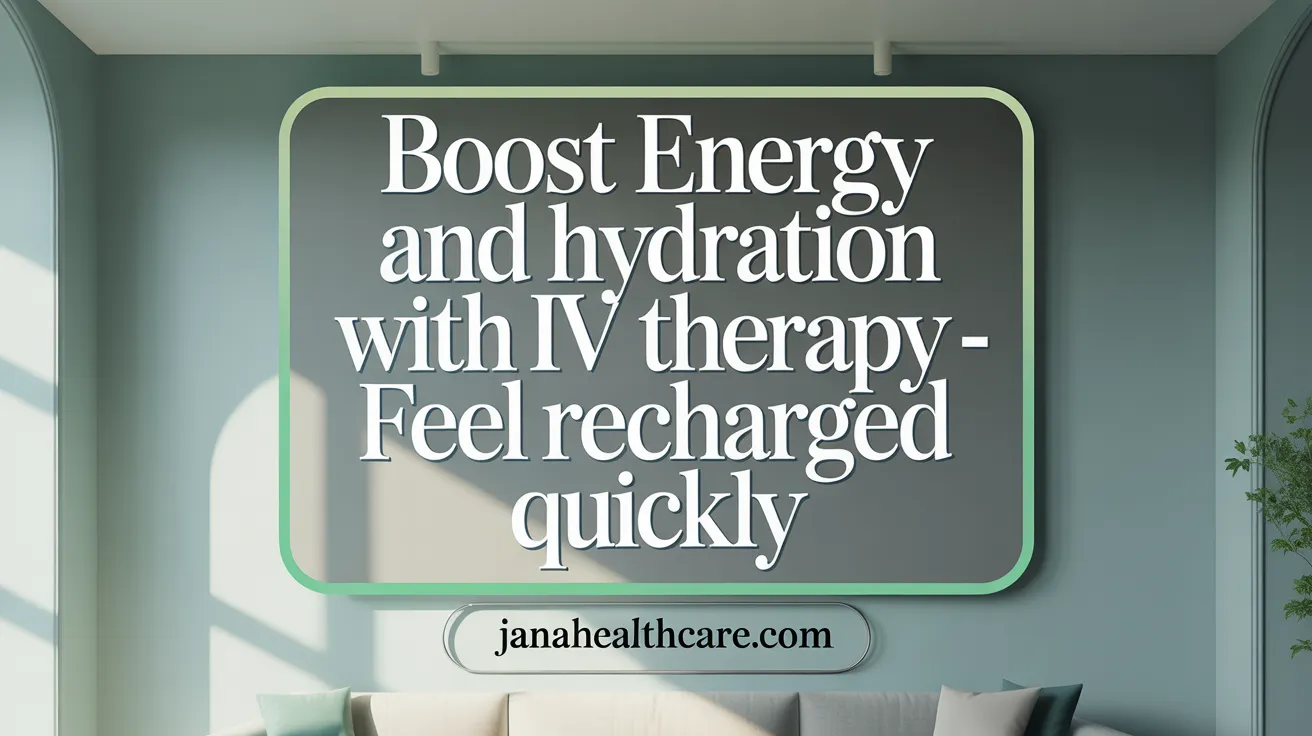Understanding Fatigue and Its Challenges
Fatigue, characterized by persistent tiredness affecting physical, mental, and emotional well-being, is a pervasive problem impacting many people's daily lives. Causes range from lifestyle factors like poor sleep, stress, and diet to underlying medical conditions such as anemia, chronic illnesses, and nutrient deficiencies. While traditional lifestyle modifications remain foundational, innovative treatments like intravenous (IV) vitamin therapy have emerged as promising options for those seeking faster, more targeted relief. This article explores how IV therapy works, its benefits, risks, and how it can be integrated naturally to help beat fatigue.
What is IV Vitamin Therapy and How Does It Work?

Definition of IV Vitamin Therapy
IV vitamin therapy involves administering vitamins, minerals, and other nutrients directly into the bloodstream via an intravenous (IV) line. This method bypasses the digestive system, allowing the body to absorb nutrients more rapidly and efficiently than oral supplements.
Myers’ Cocktail Composition and Function
A popular formulation used in IV therapy is the Myers' cocktail. It contains B complex vitamins, including B1, B2, B3, B5, B6, and B12, vitamin C, magnesium, calcium, zinc, and glutathione. Together, these nutrients support cellular metabolism, reduce oxidative stress, enhance hydration, regulate muscle function, and promote mental clarity.
Direct Nutrient Absorption vs. Oral Supplements
Unlike oral vitamins, which must pass through the digestive tract and may be partially degraded or poorly absorbed, IV vitamin therapy delivers nutrients straight into the bloodstream. This results in near-complete absorption and faster delivery to tissues where they can combat fatigue and support bodily functions more effectively.
Common Nutrients Administered
Typical nutrients included in IV vitamin therapy for energy and fatigue relief are:
- B complex vitamins (for energy metabolism and nervous system health)
- Vitamin C (antioxidant and immune support)
- Magnesium (muscle function and fatigue reduction)
- Zinc (immune health and energy conversion)
- Glutathione (antioxidant defense and detoxification)
- Calcium (muscle and nerve function)
Procedure Duration and Safety Considerations
An IV vitamin therapy session usually lasts about 30 to 60 minutes and is administered by trained healthcare professionals in clinical or wellness settings. It is generally considered safe when performed properly, although people with certain conditions such as kidney or heart problems should seek medical advice before treatment.
Potential Applications for Fatigue-Related Conditions
IV vitamin therapy is often used to treat fatigue associated with chronic fatigue syndrome, adrenal fatigue, dehydration, post-exercise recovery, stress-related energy depletion, and nutrient malabsorption issues. Patients often report feeling recharged and more energetic shortly after treatment, with effects lasting up to two weeks.
The Benefits of IV Therapy for Fatigue Relief

Rapid nutrient delivery and effects
IV vitamin therapy administers essential vitamins, minerals, and fluids directly into the bloodstream, bypassing the digestive system. This direct infusion allows for faster absorption and quicker onset of benefits, often within 30 minutes. Patients frequently report feeling recharged and more energized shortly after treatment.
Energy production support
Key nutrients in IV therapy such as B vitamins (B12, B6, B complex), magnesium, and vitamin C play vital roles in cellular metabolism and energy generation. B vitamins facilitate the conversion of food into usable energy, while magnesium supports muscle function and combats fatigue. Vitamin C reduces oxidative stress and supports immune function, contributing to overall vitality.
Hydration and electrolyte balance
Dehydration is a common contributor to fatigue. IV therapy includes fluids enriched with electrolytes like sodium, potassium, calcium, and magnesium to restore fluid balance rapidly. Proper hydration supports nerve function, muscle performance, and helps reduce tiredness and muscle cramps.
Mental clarity and stress reduction
IV therapy often contains amino acids and antioxidants like glutathione, which help reduce oxidative stress and improve neurotransmitter production. Many patients experience improved mental clarity and reduced stress-related fatigue, supporting better focus and mood.
Supporting chronic conditions and recovery
IV vitamin therapy may benefit individuals with chronic fatigue syndrome, adrenal fatigue, or those recovering from intense physical activity or illness. By replenishing depleted nutrients and improving hydration, it enhances recovery and supports sustained energy levels.
Potential duration of effects
The energy and hydration benefits of IV therapy can last approximately two weeks, with some individuals choosing repeat treatments monthly or as needed for ongoing fatigue management.
Overall, IV vitamin therapy offers a multifaceted approach to combating tiredness by replenishing nutrients, rehydrating the body, and supporting metabolic and immune function for improved energy and well-being.
Scientific Evidence and Clinical Perspectives on IV Therapy for Fatigue

Clinical Reports and Anecdotal Evidence
IV vitamin therapy has been used clinically for decades, with practitioners like Alan Gaby administering around 15,000 treatments. Anecdotal evidence from such experiences suggests that IV therapy is generally safe and may effectively reduce symptoms of fatigue and chronic illnesses such as asthma. Many patients report feeling recharged and experiencing relief shortly after infusion sessions.
Limitations of Scientific Studies
Despite widespread use, there is limited robust scientific evidence validating the effectiveness of IV vitamin therapy for fatigue. Existing studies often have small sample sizes and methodological shortcomings, which make their conclusions tentative. For example, research involving cancer patients and fibromyalgia sufferers has shown potential fatigue reduction, but these findings require confirmation through larger, controlled trials. See IV vitamin therapy overview for more details.
Potential Benefits in Specific Medical Conditions
IV therapy may be notably beneficial in cases where nutrient absorption is impaired due to digestive issues or chronic illness. High-dose vitamin C infusions have demonstrated fatigue reduction and antioxidant benefits in cancer patients, while the Myers' cocktail has been used to support energy and immune function in various conditions.
Vitamin Toxicity and Safety Precautions
Since IV administration bypasses the digestive system, there is a risk of vitamin toxicity and nutrient overload if not carefully monitored. Excessive vitamin C can lead to kidney stones, and imbalanced electrolytes pose risks, especially for patients with renal or heart conditions. Medical supervision is crucial to avoid adverse effects.
Reported Side Effects and Risks
Side effects of IV vitamin therapy can include allergic reactions, electrolyte imbalance, overhydration, abnormal heart rhythms, and infusion site complications such as vein inflammation or infection. Patients with underlying health issues should exercise caution. See Side Effects of Infusion Treatments and details on IV therapy risks and safety.
Cost Considerations and Insurance Coverage
The cost of IV vitamin therapy varies widely, typically ranging from around $250 to $800 per session. Most insurance plans do not cover this treatment, often making it a costly option for ongoing fatigue management. More information on cost and coverage of IV vitamin therapy is available.
Is there scientific evidence supporting the effectiveness of IV vitamin therapy for fatigue?
While anecdotal reports and some clinical observations, including those by practitioners like Alan Gaby, suggest IV vitamin therapy is safe and may relieve symptoms of fatigue and chronic conditions like asthma, robust scientific evidence remains limited and inconclusive. Some studies in cancer patients and individuals with fibromyalgia indicate potential benefits in reducing fatigue and improving quality of life, but methodological limitations and small sample sizes temper these findings. The therapy poses risks such as vitamin toxicity, electrolyte imbalances, kidney strain, and allergic reactions, emphasizing the need for medical supervision.
Complementary Natural Strategies to Enhance Energy and Support IV Therapy

How can lifestyle changes complement IV vitamin therapy to fight fatigue naturally?
Many individuals experience fatigue due to lifestyle-related factors such as poor diet, insufficient sleep, dehydration, stress, and lack of physical activity. Addressing these can complement the nutrient replenishment provided by IV vitamin therapy for a more sustainable boost in energy.
Lifestyle factors contributing to fatigue
Poor eating habits, disrupted sleep patterns, emotional stress, and sedentary behavior are common contributors to tiredness. Fatigue often improves when these factors are managed alongside any medical treatment, as outlined in Self-help tips for tiredness.
Dietary and hydration recommendations
Eating balanced meals and snacks every 3 to 4 hours that emphasize low glycemic index foods—like whole grains, vegetables, nuts, and healthy oils—helps maintain steady energy. Proper hydration is essential since dehydration can cause or worsen fatigue, a key point in Proper hydration and energy.
Exercise and sleep hygiene
Even light exercise, such as a daily 15-minute walk, can enhance energy by increasing blood circulation and brain neurotransmitters. Good sleep hygiene practices, including setting regular sleep and wake times and avoiding naps and stimulants like caffeine late in the day, support restorative rest. Learn more about exercise and sleep to combat fatigue.
Stress management techniques
Managing stress through activities like yoga, meditation, music, and socializing can decrease burnout. Counseling and cognitive behavioral therapy may help when fatigue arises from mental health conditions. For more, see stress reduction techniques.
Role of counseling and behavioral therapy
Talking therapies provide tools to reduce anxiety and depression symptoms and improve coping, ultimately reducing fatigue linked to emotional factors, further discussed in fatigue management with mental health support.
Synergy with IV therapy for sustained energy
While IV vitamin therapy offers rapid nutrient replenishment and hydration, combining it with lifestyle modifications tackles the underlying causes of fatigue. This holistic approach can lead to longer-lasting energy improvements rather than transient effects from IV infusions alone.
Safety and Risks Associated with IV Vitamin Therapy

What are the risks and side effects of IV vitamin therapy?
IV vitamin therapy is generally considered safe when administered by trained healthcare professionals who use sterile techniques. However, it carries potential risks. Common adverse effects include allergic reactions ranging from mild skin redness to severe anaphylaxis. Complications related to the intravenous site include phlebitis (vein inflammation), infiltration (fluid leakage into surrounding tissue), and infection. For more detailed information, see Phlebitis caused by peripheral IV therapy, and Managing Infusion Treatment Side Effects.
Excessive doses of vitamins can lead to toxicity. For example, high vitamin C levels may cause kidney strain and the formation of kidney stones. Electrolyte imbalances and fluid overload are also risks, potentially affecting heart and kidney function, particularly in individuals with underlying conditions. Additional background on these risks can be found at IV Vitamin Therapy: Risks and IV Therapy Risks and Safety.
Who should avoid IV therapy?
People with kidney disease, heart problems, or electrolyte disturbances like low magnesium or potassium should avoid or approach IV therapy with caution due to increased susceptibility to adverse effects. Pregnant or breastfeeding individuals are also advised to consult with healthcare providers prior to treatment. Guidance on contraindications and precautions is available in Safety of IV Vitamin Therapy and When to Consult a Healthcare Provider.
Why is professional administration important?
Professional administration ensures proper vein selection, sterile technique, and precise dosing, significantly reducing the risk of infection, vein damage, and allergic reactions. Trained staff closely monitor patients during infusion to promptly address any side effects. Learn about proper IV therapy administration and safety protocols at IV Therapy Overview and Safety, and Safe IV Therapy Administration.
What about complications from IV insertion?
Insertion complications can include vein damage, bleeding, swelling, bruising, hematoma, and nerve injury. Proper technique and careful monitoring are essential to minimize these local complications. Detailed information on local complications related to peripheral IV therapy is found in Phlebitis and Infiltration Complications.
How are side effects monitored and managed?
Continuous monitoring of vital signs like blood pressure and heart rate during infusion helps detect early signs of fluid overload or allergic reaction. Patients are advised to report any discomfort immediately. Should adverse reactions occur, the infusion is adjusted or stopped, and supportive care given. Guidance on management of infusion therapy side effects is provided in Managing Infusion Therapy Side Effects and Side Effects of Infusion Treatments.
What about the cost and accessibility?
IV vitamin therapy treatments can be expensive, typically ranging from $250 to $800 per session. Insurance usually does not cover these treatments, making them less accessible for regular use. Individuals should consider this along with the limited scientific evidence of benefit before opting for therapy. For insights into the cost, coverage, and evidence, see Cost of IV Vitamin Therapy and IV Vitamin Therapy Effectiveness and Evidence.
Integrating IV Therapy for Fatigue into a Holistic Wellness Plan
Customizing IV treatments for individual needs
IV vitamin therapy offers flexibility in formulation, allowing healthcare providers to tailor nutrient blends for specific fatigue-related concerns. Custom mixes may include the Myers' cocktail—which contains B complex vitamins, magnesium, Vitamin C, Zinc, and other antioxidants—as well as additional amino acids or electrolytes. This customization helps address nutrient deficiencies, support mitochondrial function, and reduce oxidative stress.
Role in chronic fatigue and recovery
For individuals experiencing chronic fatigue syndrome (CFS) or fatigue from illness, IV therapy can provide rapid replenishment of critical vitamins and hydration, potentially improving energy and mental clarity within hours. It is also useful during recovery phases after intense physical activity or health setbacks, accelerating nutrient restoration and reducing symptoms such as muscle aches and cognitive fog.
When to seek medical consultation
Before starting IV therapy, it is essential to consult a healthcare professional for a thorough evaluation. This ensures that underlying causes of fatigue are diagnosed and that potential risks—such as kidney issues or electrolyte imbalances—are identified. Medical supervision guarantees safe administration, monitoring for side effects, and prevents complications like vitamin toxicity or allergic reactions.
Combining IV therapy with other treatments
IV therapy should be integrated as part of a broader fatigue management plan. Lifestyle adjustments such as improved sleep hygiene, balanced nutrition, regular exercise, and stress reduction techniques greatly enhance outcomes. In some cases, adjunct therapies like counseling, hydration strategies, or medication may be recommended alongside IV treatment for optimal recovery.
Encouraging safe use and evidence-based practice
Patients are advised to seek IV therapy only from qualified healthcare facilities that adhere to strict safety protocols. Given the limited but promising evidence, IV therapy should not replace foundational health practices. Critical evaluation of claims and awareness of potential side effects support responsible use while maximizing benefits.
Future perspectives and research needs
Current data suggest benefits of IV vitamin therapy for fatigue, but stronger, larger-scale clinical trials are necessary to establish long-term efficacy and optimized dosing regimens. Continued research will help clarify its role in chronic fatigue and other fatigue-related conditions, fostering evidence-based guidelines and improved patient care.
The Path to Renewed Energy with IV Therapy
IV vitamin therapy offers a scientifically grounded yet still emerging approach to combating fatigue, providing rapid delivery of essential nutrients that support energy metabolism, hydration, and immune function. While promising, it is not a standalone solution and should be integrated thoughtfully with natural lifestyle strategies including diet, sleep, exercise, and stress reduction. Careful medical evaluation and professional administration are crucial to maximize benefits and minimize risks. As research progresses, IV therapy may become an increasingly valuable tool for those seeking natural, efficient relief from persistent fatigue, helping more individuals reclaim vitality and enhance quality of life.
